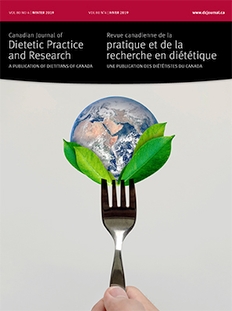Abstract
Purpose: To determine predictors of food skills in university students, specifically, the relative effects of a food and nutrition (FN) course; sex, age, and body mass index; food-related behaviours in the parental home; and food-related behaviours in university.
Methods: Undergraduate students (n = 30 310) at Western University were invited to complete an online cross-sectional survey that assessed 7 components of food skills, from mechanical (e.g., peeling/chopping) to conceptual (e.g., weekly meal planning). The primary outcome measure was Total Food Skills Score (TFSS). All variables that were statistically associated with TFSS (P < 0.05) were analyzed hierarchically in 4 regression models.
Results: The sample was comprised of 3354 students living independently for 2.6 ± 1.1 years. Students who had taken an FN course had higher food skills than those who had not (B = 30.72; P < 0.001), and this relationship remained significant through all subsequent models. The strongest predictor of food skills was meal preparation as a teen (B = 25.66; P < 0.001). Frequency of using a grocery list, packing a lunch, and time spent preparing meals on weekends were positively associated with food skills (P < 0.001), whereas frequency of buying pre-prepared meals was negatively associated with food skills (P < 0.001).
Conclusions: Food skill development should occur well before young adults begin living independently.
Résumé
Objectif. Déterminer les prédicteurs des compétences alimentaires chez les étudiants universitaires, en particulier les effets relatifs d’un cours sur l’alimentation et la nutrition (AN); le sexe, l’âge et l’indice de masse corporelle; les comportements à l’égard des aliments au domicile des parents; et ceux adoptés à l’université.
Méthodes. Des étudiants du premier cycle (n = 30 310) de l’Université Western ont été invités à participer à une enquête transversale en ligne qui évaluait 7 composantes des compétences alimentaires, des compétences mécaniques (p. ex., peler/hacher) aux compétences conceptuelles (p. ex., planification hebdomadaire des repas). Le score total des compétences alimentaires (STCA) était la principale mesure de résultat. Toutes les variables statistiquement associées au STCA (P < 0,05) ont été analysées de façon hiérarchique dans 4 modèles de régression.
Résultats. L’échantillon était composé de 3 354 étudiants vivant de façon autonome depuis 2,6 ± 1,1 ans. Les élèves qui avaient suivi un cours sur l’AN avaient de meilleures compétences alimentaires que les autres (B = 30,72; P < 0,001), et cette relation est demeurée significative dans tous les modèles subséquents. Le plus fort prédicteur de compétences alimentaires était la préparation des repas à l’adolescence (B = 25,66; P < 0,001). La fréquence d’utilisation d’une liste d’épicerie ou d’une boîte à lunch et le temps consacré à la préparation des repas la fin de semaine étaient associés positivement aux compétences alimentaires (P < 0,001), tandis que la fréquence d’achat de repas préparés était associée négativement aux compétences alimentaires (P < 0,001).
Conclusions. Le développement des aptitudes alimentaires devrait avoir lieu bien avant que les jeunes adultes commencent à vivre de façon autonome.



